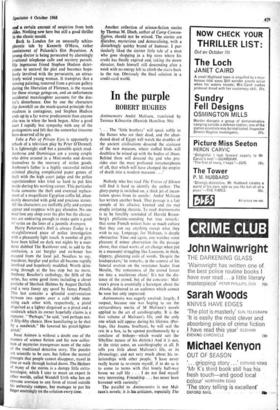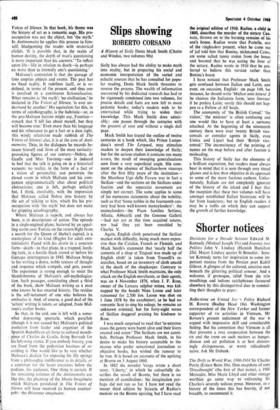In the purple
ROBERT HUGHES
Antimemoirs Andre Malraux, translated by Terence Kilmartin (Hamish Hamilton 50s) . . The "little brothers" will speak softly to the flames who are their dead, and the aban- doned dead of Egypt will watch the doubles of the ancient civilisations descend the staircase of the new museum, where stuffed birds will doubtless be mixed up with the bodies of ibises. Behind them will descend the god who pre- sides over the most profound metamorphosis of all, that which will have changed the empire of death into a modern museum . .
Nobody who has read The Voices of Silence will find it hard to identify the author. The glory-pump is switched on, a thick jet of incan- tation spews from its nozzle: Andre Malraux has written another book. That passage is a fair sample of his allusive, knotted and (to me) deeply irritating rhetoric. To read Anthnernoirs is to be forcibly reminded of Harold Rosen- berg's philistine-sounding but true remark : that some French writers have so much culture that they can say anything except what they wish to say. Language, for Malraux, is deeply obstructive. Time and again, one watches some pleasant if minor observation (in the passage above, that ritual works of art change when put in a museum) struggling like Laocoon, in thick, slippery, glistening coils of words. 'Despite the loudspeakers,' he remarks, in the context of his funeral oration on the resistance leader Jean Moulin, 'the remoteness of the crowd forces me into a vociferous chant.' It's not the dis- tance of the crowd, but of the concrete : Mal- raux's prose is essentially a harangue about the A bsolu, delivered to an audience which cannot be seen but only impressed.
Antimemoirs was eagerly awaited; largely, I suspect, because one was hoping to see the extraordinary merits of M Malraux's novels applied to the art of autobiography. It is the first volume of Malraux's life, and the only one which will appear during his lifetime. (Per- haps, like Joanna Southcott, he will seal the rest in a box, to be opened posthumously by a conclave of bishops—which would suit the Sibylline nature of his diction.) And it is not, in the strict sense, an autobiography at all. It tells you little about Malraux's life, or its chronology; and not very much about his re- lationships with other people. 'I have never really learnt to re-create myself, if to do so is to come to terms with that lonely half-way house we call life . . . I do not find myself very interesting. Friendship . . . has never been leavened with curiosity.'
The parallel to Antimemoirs is not Mal- raux's novels; it is hie Rriticism, especially The Voices of Silence. In that book, his theme was the history of art as a romantic saga. His pre- occupation was not the object, but 'the myth.'
In Antimemoirs he applies this process to him- self, bludgeoning the reader with oratorical clichds. 'It is possible that, in the realm of human destiny, the depth of man's questioning is more important than his answers.' To reflect upon life—life in relation to death—is perhaps no more than to intensify one's questioning.'
Malraux's contention is that the passage of time empties objects and events. The past has
no fixed reality. It redefines itself, or is re-
defined, in terms of the present, and thus one is involved in a continuous fictionalisation.
What remains is 'the myth'; `no civilisation,' he
declared in The Voices of Silence, 'is ever un- derstood by another.' His equivalent for this, in terms of autobiography, is the hubristic—or, as the pro-Malraux faction might say, Faustian—
remark that 'I tell lies about myself, but they will become true.' Even more than his language and his reluctance to get a fact or a date right, this windy relativism made rubbish of The
Voices of Silence; alas, it is at the core of Anti-
memoirs. Thus, in the dialogues he records be- tween himself and three of the most curiosity- provoking figures of our century—Nehru, de
Gaulle and Mao Tse-tung—one is induced to feel that the talk is going on in a historical vacuum; no reality, in the form of a fact or a vision of personality, can penetrate the closed room in which Malraux and his com-
panion epigrammatically chat about political abstractions; one is left, perhaps unfairly but, I think, inevitably, with the impression that Malraux called Nehru into history by the act of talking to him, which fits his pre- occupation with 'the myth' but does not make for gripping autobiography.
Where Malraux is superb, and always has been, is in descriptions of action, The episode in a single-engined plane, battered by an appal- ling storm over Tunisia on the return flight from a search for the Queen of Sheba's capital, is a masterpiece of its kind (Biggles for adult exis- tentialists). Faced with his destin in a concrete form—death—in that plane, in a trapped, lurch- ing tank, in a hostile black crowd or before his Gestapo interrogators in 1945, Malraux brings to his writing a dense, noble texture of thought and response which compels, and gets, assent.
The experience is strong enough to resist the blandishments of Malraux's self-mythologisa- tion. Such passages, constituting about a third of the book, show Malraux writing as a man who knows he has enacted history. The residue is the self-testament of one who believes he embodies it. And, of course, a good deal of the `action' writing is taken, or adapted, from Mal- raux's earlier books.
So that, in the end, one is left with a some- what depressing spectacle, which parallels (though it is not caused by) Malraux's political evolution from leader and organiser of the Spanish Republican air force to cultural mouth- piece of Charles de Gaulle, firing Barrault for his left-wing stance. If you embody history, you are freed from the pedestrian business of re- cording it. One would like to be sure whether Malraux's disdain for exposing his life springs from a philosophic indifference to its details, or a contempt for the lesser creatures below the podium, his audience. One thing is certain. If the remaining volumes of the Antimemoirs are like this, the phantasy of the Musee lmaginaire which Malraux postulated in The Voices of Silence will have received its human counter-
the,Directeur imaginaire.







































 Previous page
Previous page